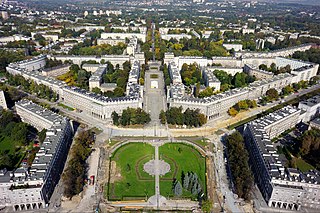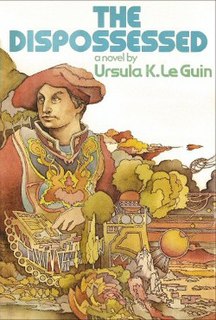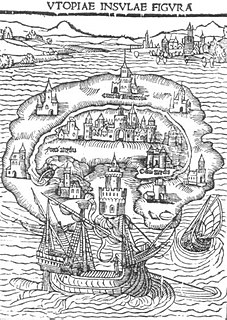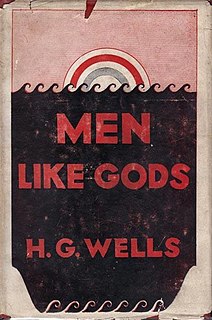Related Research Articles

A utopia is an imaginary community or society that possesses highly desirable or nearly perfect qualities for its citizens. The term was coined by Sir Thomas More for his 1516 book Utopia, describing a fictional island society in the south Atlantic Ocean off the coast of South America. The opposite of a utopia is a dystopia, which dominates the fictional literature from the 1950s onwards, chiefly because of the impact of George Orwell's Nineteen Eighty-Four (1949). However, the term can also denote actual experiments in what participants regard as a vastly superior manner of living, generally in what are termed intentional communities. In common parlance it is synonymous with "impossible", "far-fetched", and "deluded".

The Dispossessed: An Ambiguous Utopia is a 1974 utopian science fiction novel by American writer Ursula K. Le Guin, set in the fictional universe of the seven novels of the Hainish Cycle, e.g. The Left Hand of Darkness. The book won the Nebula Award for Best Novel in 1974, as well as winning both the Hugo and Locus Awards in 1975, and received a nomination for the John W. Campbell Memorial Award in 1975. It achieved a degree of literary recognition unusual for science fiction due to its exploration of themes such as anarchism and revolutionary societies, capitalism, and individualism and collectivism.
Utopian and dystopian fiction are genres of speculative fiction that explore social and political structures. Utopian fiction portrays a setting that agrees with the author's ethos, having various attributes of another reality intended to appeal to readers. Dystopian fiction offers the opposite: the portrayal of a setting that completely disagrees with the author's ethos. Some novels combine both genres, often as a metaphor for the different directions humanity can take depending on its choices, ending up with one of two possible futures. Both utopias and dystopias are commonly found in science fiction and other types of speculative fiction.

François Marie Charles Fourier was a French philosopher, an influential early socialist thinker and one of the founders of utopian socialism. Some of Fourier's social and moral views, held to be radical in his lifetime, have become mainstream thinking in modern society. For instance, Fourier is credited with having originated the word feminism in 1837.

Looking Backward: 2000–1887 is a utopian novel by Edward Bellamy, a journalist and writer from Chicopee Falls, Massachusetts; it was first published in 1888.

Thomas Spence was an English Radical and advocate of the common ownership of land and a democratic equality of the sexes. Spence was one of the leading revolutionaries of the late 18th and early 19th centuries. He was born in poverty and died the same way, after long periods of imprisonment, in 1814.

New Atlantis is an incomplete utopian novel by Sir Francis Bacon, published posthumously in 1626. It appeared unheralded and tucked into the back of a longer work of natural history, Sylva sylvarum. In New Atlantis, Bacon portrayed a vision of the future of human discovery and knowledge, expressing his aspirations and ideals for humankind. The novel depicts the creation of a utopian land where "generosity and enlightenment, dignity and splendour, piety and public spirit" are the commonly held qualities of the inhabitants of the mythical Bensalem. The plan and organisation of his ideal college, Salomon's House, envisioned the modern research university in both applied and pure sciences.
The exploration of politics in science fiction is arguably older than the identification of the genre. One of the earliest works of modern science fiction, H. G. Wells’ The Time Machine, is an extrapolation of the class structure of the United Kingdom of his time, an extreme form of social Darwinism; during tens of thousands of years, human beings have evolved into two different species based on their social class.

Utopia is a work of fiction and socio-political satire by Thomas More (1478–1535), written in Latin and published in 1516. The book is a frame narrative primarily depicting a fictional island society and its religious, social, and political customs. Many aspects of More's description of Utopia are reminiscent of life in monasteries.

The Description of a New World, Called The Blazing-World, better known as The Blazing World, is a 1666 work of prose fiction by the English writer Margaret Cavendish, the Duchess of Newcastle. Feminist critic Dale Spender calls it a forerunner of science fiction. It can also be read as a utopian work.

Men Like Gods (1923) is a novel, referred to by the author as a "scientific fantasy", by English writer H. G. Wells. It features a utopia located in a parallel universe.

A Modern Utopia is a 1905 novel by H. G. Wells.

Fourierism is the systematic set of economic, political, and social beliefs first espoused by French intellectual Charles Fourier (1772–1837). Based upon a belief in the inevitability of communal associations of people who worked and lived together as part of the human future, Fourier's committed supporters referred to his doctrines as Associationism. Political contemporaries and subsequent scholarship has identified Fourier's set of ideas as a form of utopian socialism—a phrase that retains mild pejorative overtones.

A dystopia is a fictional community or society that is undesirable or frightening. It is often treated as an antonym of utopia, a term that was coined by Sir Thomas More and figures as the title of his best known work, published in 1516, which created a blueprint for an ideal society with minimal crime, violence and poverty. But the relationship between utopia and dystopia is more complex than this, as there exist utopian elements in many dystopias, and vice-versa. Also, utopia and dystopia are not precise opposites. Utopia implies a perfectly or completely good society, while dystopia does not imply a completely bad society.
The New Paul and Virginia, or Positivism on an Island is a satirical dystopian novel written by William Hurrell Mallock, and first published in 1878. It belongs to the wave of utopian and dystopian literature that characterized the later nineteenth century in both Great Britain and the United States.
J. C. (Colin) Davis is a British historian, whose work often focuses on the Utopian thinkers of the 17th-century. He has been described as a 'historian of political and religious thought and a brilliant and provocative iconoclast. The book Liberty, Authority, Formality: Political Ideas and Culture, 1600-1900 was written in honor of Davis at the time of his retirement as professor.
Utopian socialism is the term often used to describe the first current of modern socialism and socialist thought as exemplified by the work of Henri de Saint-Simon, Charles Fourier, Étienne Cabet, and Robert Owen. Utopian socialism is often described as the presentation of visions and outlines for imaginary or futuristic ideal societies, with positive ideals being the main reason for moving society in such a direction. Later socialists and critics of utopian socialism viewed utopian socialism as not being grounded in actual material conditions of existing society and in some cases as reactionary. These visions of ideal societies competed with Marxist-inspired revolutionary social democratic movements.
Islands of the Sun or The Adventures of Iambulus in the Southern Ocean is a utopian novel by Iambulus which was written in Greek between 165 and 50 B.C.E. It chronicles the journey of the eponymous character Iambulus who discovers a seemingly perfect island nation. This book comprises eight chapters which describe the island’s geography and its inhabitants’ culture.
References
- ↑ R. C. S. Trahair, Utopias and Utopians: An Historical Dictionary, Westport, CT, Greenwood Publishing, 1999; pp. 382-3.
- ↑ Ian Tod and Michael Wheeler, Utopia: An Illustrated History, New York, Harmony Books, 1987.
- ↑ P. Mary Ashraf, The Life and Times of Thomas Spence, Newcastle upon Tyne, Frank Graham, 1983.
- ↑ Joan C. Beal, English Pronunciation in the Eighteenth Century, Oxford, Oxford University Press, 2002; pp. 1-12.
- ↑ Lyman Tower Sargent, "Themes in Utopian Fiction in English before Wells," Science Fiction Studies, Vol. 3 No. 3 (November 1976), pp. 275-82; see p. 277.
- ↑ Lewis Mumford, The Story of Utopias, New York, Boni and Liveright, 1922; Forgotten Books, 2008; pp. 81-3.